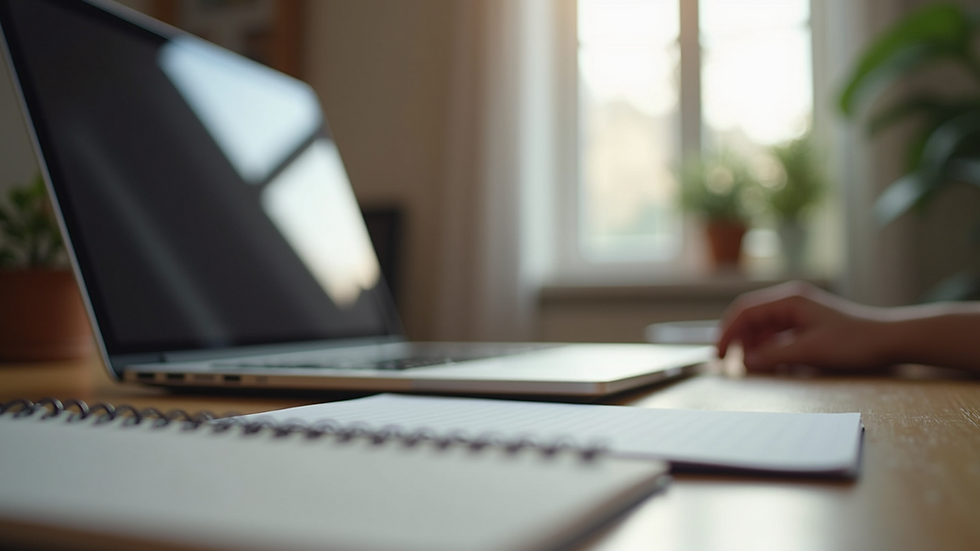The post title 2
- Awa
- il y a 3 jours
- 3 min de lecture

Starting a new project or managing daily tasks can feel overwhelming without the right approach. Many people struggle to stay focused and organized, which leads to missed deadlines and unnecessary stress. This post will guide you through practical steps to improve your productivity and manage your time effectively.
Understanding Productivity and Its Importance
Productivity is about doing more with less effort and time. It means working smarter, not harder. When you improve your productivity, you can achieve your goals faster and have more free time for other activities.
Being productive is not just about working long hours. It’s about prioritizing tasks, minimizing distractions, and maintaining a healthy balance between work and rest. This balance helps prevent burnout and keeps your motivation high.
Setting Clear Goals
Clear goals give you direction and purpose. Without them, it’s easy to get lost in unimportant tasks. To set effective goals:
Define what you want to achieve in specific terms.
Break large goals into smaller, manageable steps.
Set deadlines for each step to keep yourself accountable.
Review and adjust your goals regularly based on progress.
For example, if your goal is to write a report, break it down into research, outlining, drafting, and editing. Assign deadlines to each part to stay on track.
Prioritizing Tasks Effectively
Not all tasks have the same level of importance. Prioritizing helps you focus on what matters most. Use methods like the Eisenhower Matrix to categorize tasks:
Urgent and important: Do these immediately.
Important but not urgent: Schedule time to do these.
Urgent but not important: Delegate if possible.
Neither urgent nor important: Consider dropping these tasks.
This approach ensures you spend your energy on tasks that contribute to your goals.
Managing Time Wisely
Time management is crucial for productivity. Here are some tips to manage your time better:
Use a planner or digital calendar to schedule your day.
Allocate specific time blocks for focused work.
Take regular breaks to recharge your mind.
Avoid multitasking, as it reduces efficiency.
Set limits on time spent on emails and meetings.
For instance, try the Pomodoro Technique: work for 25 minutes, then take a 5-minute break. Repeat this cycle to maintain concentration.
Minimizing Distractions
Distractions can derail your productivity quickly. To minimize them:
Turn off non-essential notifications on your devices.
Create a dedicated workspace free from noise and interruptions.
Inform others of your work schedule to reduce unexpected disturbances.
Use apps that block distracting websites during work hours.
By controlling your environment, you can maintain focus and complete tasks faster.
Using Tools to Boost Productivity
Several tools can help you stay organized and efficient:
Task management apps like Todoist or Trello help track progress.
Note-taking apps like Evernote or OneNote keep your ideas organized.
Time-tracking apps like RescueTime show how you spend your day.
Calendar apps help schedule and remind you of important deadlines.
Choose tools that fit your style and needs to enhance your workflow.
Staying Motivated and Avoiding Burnout
Maintaining motivation is key to long-term productivity. Try these strategies:
Celebrate small wins to build momentum.
Set rewards for completing tasks.
Keep a positive mindset and remind yourself of your goals.
Balance work with hobbies and social activities.
Get enough sleep and exercise regularly.
Burnout happens when you push yourself too hard without rest. Listen to your body and take breaks when needed.
Learning from Setbacks
Everyone faces setbacks. Instead of getting discouraged:
Analyze what went wrong and why.
Adjust your plan to avoid similar issues.
Seek feedback from others.
Keep moving forward with a flexible mindset.
Mistakes are opportunities to learn and improve your productivity skills.
Practical Example: Organizing a Community Event
Imagine you are organizing a community event. Applying these principles:
Set a clear goal: Host a successful event with 100 attendees.
Break down tasks: Venue booking, invitations, catering, and entertainment.
Prioritize urgent tasks like venue booking early.
Schedule time blocks for each task.
Use a task app to assign responsibilities.
Minimize distractions by working in a quiet space.
Stay motivated by tracking progress and celebrating milestones.
This structured approach helps ensure the event runs smoothly.
Final Thoughts
Improving productivity is a continuous process that requires clear goals, effective time management, and focus. By applying these practical steps, you can work more efficiently and enjoy a better balance in your life. Start small, stay consistent, and watch your productivity grow.
Take the first step today by setting one clear goal and planning how to achieve it. Your future self will thank you.


Commentaires